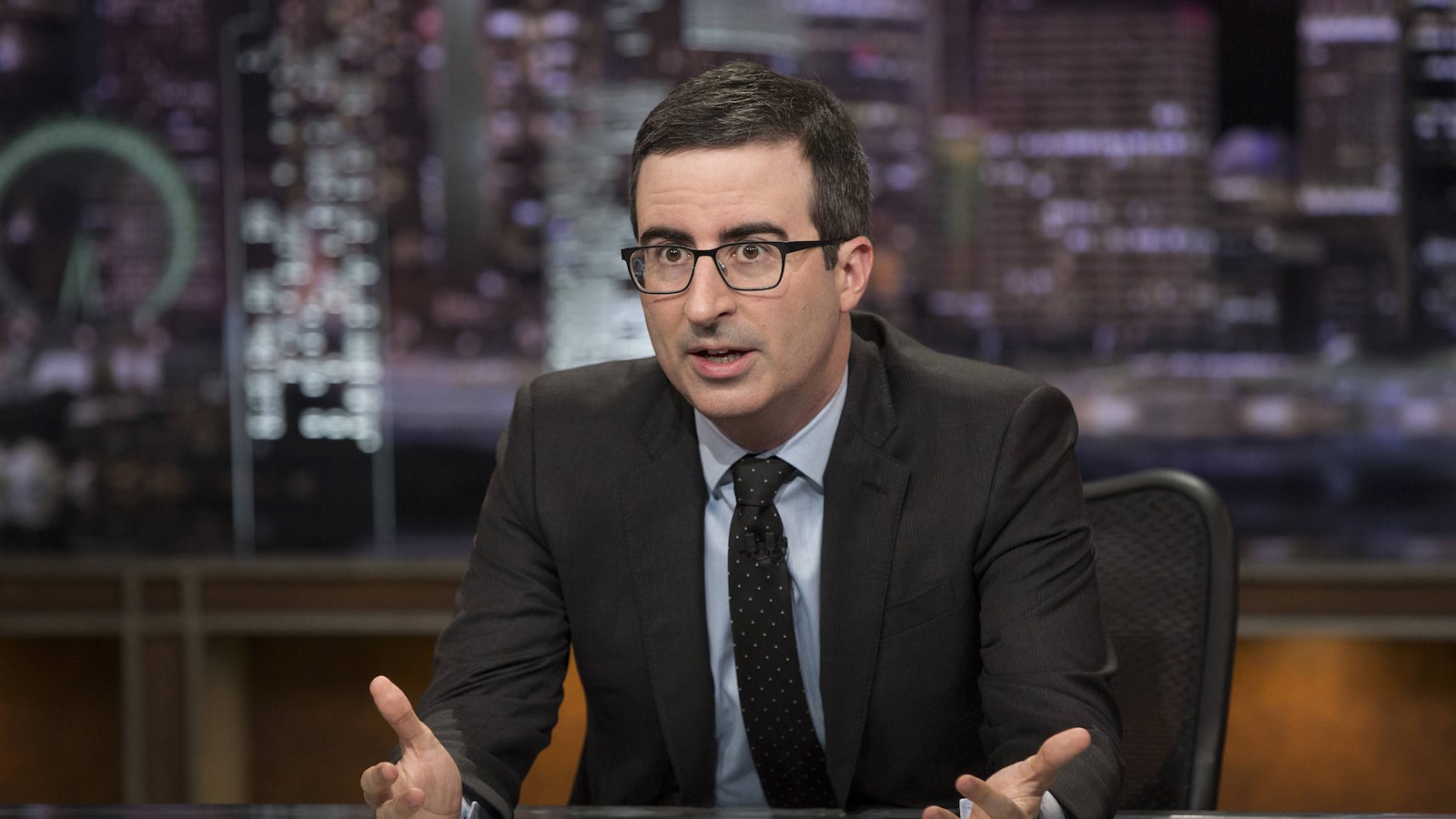Following Thursday’s horrific mass shooting at Oregon’s Umpqua Community College, perpetrated by a 26-year-old armed with six guns, President Obama laid the blame squarely at the feet of the American people for not doing more about gun control.
“This is a political choice that we make to allow this to happen every few months in America,” said Obama. “We collectively are answerable to those families who lose their loves ones because of our inaction.”
The GOP’s crop of 2016 presidential candidates instead cited “mental health” as the chief cause of mass shootings.
This isn’t guns, this is really about mental illness. —Donald Trump.
Do we need to do a better job in mental health? You bet we do. —Mike Huckabee.
In many of these shootings, people have mental disturbances. —Ben Carson.
On Sunday night’s edition of Last Week Tonight with John Oliver, the witty satirist appeared incensed by the GOP candidates’ “mental health” default response in the wake of mass shootings, since it’s the only time right-wingers seem to bring up the country’s mental health problem.
“Perhaps the clearest sign of just how little we want to talk about mental health is that one of the only times it’s actively brought up is, as we’ve seen yet again this week, is in the aftermath of a mass shooting as a means of steering the conversation away from gun control,” said Oliver.“It seems there is nothing like a mass shooting to suddenly spark political interest in mental health,” continued Oliver. “Although it’s worth noting that Governor Huckabee’s state [Arkansas] got a grade of D- on mental health care while he was in office. And you can’t lecture people on something you got a D- in.”
Oliver then cited a pair of reports indicating that less than 5 percent of the 120,000 gun-related killings were perpetrated by people diagnosed with mental disorders (American Journal of Public Health, February 2015), and that the large majority of people with mental disorders are nonviolent (Annals of Epidemiology, May 2015).
“The aftermath of a mass shooting might actually be the worst time to talk about mental health, because for the record, the vast majority of mentally ill people are nonviolent, and the vast majority of gun violence is committed by non-mentally ill people,” Oliver said. “In fact, mentally ill people are far more likely to be the victims of violence rather than the perpetrators, so the fact that we tend to only discuss mental health in a mass shooting context is deeply misleading.”
Yes, America does have a serious mental health problem. In 2013, an estimated 43.8 million Americans dealt with some form of mental illness, and an estimated 10 million Americans suffer from a serious mental illness each year.
But our country’s history of dealing with mental illness has been embarrassing, to say the least. From decrepit mental asylums—dubbed “snake pits”—to mandatory electroshock therapy, it’s always been a mess. In the 1960s, President Kennedy signed a bill to close down as many of these underperforming asylums as possible and replace them with community health centers—only we never found the proper funding for the centers, and since all the people had to go somewhere, according to Oliver, “some of the places they wound up are shocking.”In 2009, the AP found that 125,000 young and middle-aged mental health patients were placed in nursing homes. And some states are even involved in “Greyhound Therapy,” where, owing to a lack of space (see: funding), ill patients are discharged too soon and provided with a one-way ticket out of town. If all that weren’t enough, some 2 million people with mental illness go to jail every year, which means there are 10 times more people behind bars than there are receiving psychiatric treatment.
“Using the criminal justice system to treat the mentally ill isn’t just ineffective—it’s expensive, and it’s dangerous,” said Oliver. “Because often, when someone is having a mental health emergency, the police will be called, and that can end tragically. By some estimates, an incredible half of all incidents involving the police use of deadly force involve a mentally ill person.”
So how are we combating mental illness? By not doing much. Only 15 percent of law enforcement agencies have Crisis Intervention training programs to prevent those high numbers of police use of deadly force against the mentally infirm, and programs like Assertive Community Treatment, which is “designed to let those with serious mental illnesses live in the community by providing regular in-home visits and help coordinating assistance in things like housing and employment,” are constantly defunded due to budget cuts or Medicaid reimbursement problems.
“The public safety net for the mentally ill spans Medicaid, which is different across the country; eight federal agencies who administer 112 different programs that in some way touch on mental health; and the social service agencies in each of the 50 states,” said Oliver. “It’s a clusterfuck.”
“We as a society, we have to figure out how to fund [mental health programs]—not just because it makes fiscal sense, but because it would save lives. And if I remember rightly, there are some politicians who claim to be pretty motivated to address this problem,” said Oliver, again throwing to the post-Umpqua shooting quotes by Trump, Huckabee, and Carson, about how we need to address our country’s mental health problem.
“OK, fine—do it then,” shouted Oliver. “Because if we’re going to constantly use mentally ill people to dodge conversations about gun control, then the very least we owe them is a fucking plan.”






